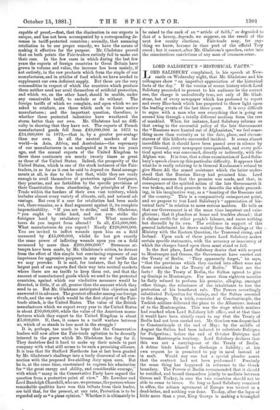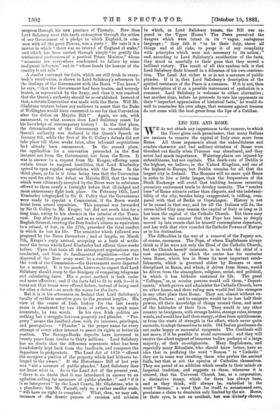LORD SALISBURY'S "HISTORICAL FACTS."
LORD SALISBURY complained, in his speech at New-
castle on Wednesday night, that Mr. Gladstone and his colleagues show "an imperfect appreciation of the historical facts of the day." If the version of recent history which Lord Salisbury proceeded to present to his audience be the correct one, the charge is undoubtedly true, not only of Mr. Glad- stone, but of every newspaper which has professed to report and every Blue-book which has purported to throw light upon the leading events of the last three years. It is very difficult to argue with a man who sees everything that is going on around him through a totally different medium from the rest of mankind. When, for instance, Lord Salisbury informs us that owing to the successful policy of the late Government the "Russians were bunted out of Afghanistan," we feel some- thing more than curiosity as to the date, place, and circum- stances of this hitherto unrecorded incident. It seems almost incredible that it should have been passed over in silence by every General, every newspaper correspondent, and every poli- tical agent who was concerned, directly or indirectly, with the Afghan war. It is true, that a close examination of Lord Salis- bury's speech clears up this particular difficulty. It appears that what he is really referring to is General Kaufmann's refusal to give Shere Ali the armed assistance which the latter under- stood that the Russian Envoy had promised him. Lord Salisbury assumes that the promise was made, and that, in consequence of the spirited action of the late Government it was broken, and then proceeds to describe the whole proceed- ing, in his imaginative way, as a "hunting of the Russians out of the country." This is a comparatively unimportant point, and we propose to test Lord Salisbury's appreciation of his- torical facts" in relation to more serious matters. He tells us that our Government is at the same time impotent and vain- glorious ; that it plunders at home and truckles abroad ; that it claims credit for other people's labours, and earns nothing but discredit by its own. The evidence in support of this general indictment he draws mainly from the dealings of the • Ministry with the Eastern Question, the Transvaal rising, and Ireland. Upon each of these points Lord Salisbury makes certain specific statements, with the accuracy or inaccuracy of which the charges based upon them must stand or fall.
In the first place, Lord Salisbury denies that with respect to Montenegro and Greece, the Government have carried out the Treaty of Berlin. "They apparently forget," he says, "that the provisions which they carried into effect were not those contained in the Treaty of Berlin." What are the facts ? By the Treaty of Berlin, the Sultan agreed to give up Gusinje to Montenegro. For more than eighteen months he flatly refused to perform his promise, alleging, amongst other things, the reluctance of the inhabitants to lose the protection of his beneficent rule. The Powers accordingly substituted Podgoritza for Gusinje, and the Sultan assented to the change. By a trick, concerted at Constantinople, the Turkish soldiers delivered the place to the Albanians, instead of to the Montenegrins. This was the stage which matters had reached when Lord Salisbury left office, and at that time it would have been strictly exact to say that the Treaty of Berlin had not been carried out. Mr. Goschen was despatched to Constantinople at the end of May ; by the middle of August the Sultan had been induced to substitute Dulcigno for Podgoritza ; before the end of October Dulcigno had become Montenegrin territory. Lord Salisbury declares that this was not a carrying-out of the Treaty of Berlin.
A debtor binds himself to discharge a liability ; at his own request he is permitted to pay in meal instead of in malt. Would any one but a special pleader assert that the contract had not been performed ? Precisely the same thing has happened in reference to the Greek boundary. The Powers at Berlin recommended that it should be rectified, and bound themselves jointly to mediate between Greece and Turkey, in case the two countries should not be able to come to terms. So long as Lord Salisbury remained in office, the solemn agreement of Europe was treated as a dead-letter, and nothing was done. To-day, after the lapse of little more than a year, King George is making a triumphal progress through his new province of Thessaly. How does Lord Salisbury treat this tardy redemption through the action of our Government of a pledge to which England, in com- mon with all the great Powers, was a party ? He says it is a matter in which "there was no interest of England at stake," and which has been carried through simply "to gratify the sentimental preferences of a poetical Prime Minister," whose "measures are everywhere condemned to failure by some malignant influence," and in "whose hands the honour of the country is not safe."
A similar contempt for facts, which are still fresh in every- body's recollection, is shown in Lord Salisbury's references to the dealings of the Government with the Boers. "You know," he says, "that the Government had been beaten, and severely beaten, as represented by the Army, and then it was resolved that the Queen's authority should be re-established. Instead of that, a certain Convention was made with the Boers. Will Mr. Gladstone venture before any audience to assert that the Duke of Wellington would have consented to sue for that Convention after the defeat on Majuba Hill ?" Again, we ask, with amazement, to what sources does Lord Salisbury resort for his knowledge of contemporary history ? In the first place, the determination of the Government to re-establish the Queen's authority was declared in the Queen's Speech on January 6th, while the first of Sir G. Colley's defeats did not take place till three weeks later, after informal negotiations
hai already been commenced. In the second place, the application for a convention proceeded in the first instance not from the Government, but from the Boers. It was in answer to a request from Mr. Kruger, offering upon certain terms to suspend hostilities, that Lord Kimberley agreed to open regular negotiations with the Boers. In the third place, so far is it from being true that the Convention was sued for after the defeat on Majuba Hill, that the terms which were ultimately accepted by the Boers were in substance offered to them nearly a fortnight before that ill-judged and most unnecessary fight took place. On February 16th, Lord Kimberley telegraphed to Sir G. Colley that the Government were ready to appoint a Commission, if the Boers would desist from armed opposition. This proposal was forwarded by Sir G. Colley to Mr. Kruger, but did not reach him for a long time, owing to his absence in the interior of the Trans- vaal. Day after day passed, and as no reply was received, the English General, treating the Boer leader's silence as equivalent to a refusal, at last, on the 27th, provoked the fatal conflict in which he lost his life. The armistice which followed was proposed by the Boers themselves ; and at length, on March 7th, Kruger's reply arrived, accepting as a basis of settle- ment the terms which Lord Kimberley had offered three weeks before. Upon that basis all the subsequent negotiations were conducted, and from its fundamental stipulation—that the dispersal of the Boer army must be a condition precedent to the work of the Commission—the Government never departed for a moment. It is too much, however, to expect that Lord Salisbury should stoop to the drudgery of comparing telegrams and calculating dates. His a priori method is both easier and more effective ; and if the facts fail to fit in with it—if it turns out that terms were offered before, instead of being sued for after a defeat—so much the worse for the facts.
But it is in his utterances on Ireland that Lord Salisbury's faculty of reckless assertion goes to the greatest lengths. His view of the course of Irish history for the last twenty years is dominated by two ideas, or rather, to speak more accurately, by two words. In his eyes, Irish politics are nothing but a struggle between property and plunder. " Pro- perty " means the landlord class, with its interests, privileges, and prerogatives. "Plunder" is the proper name for every attempt of every other interest to assert its rights or better its position. The Savings-Banks deposits have increased in twenty years from twelve to thirty millions. Lord Salisbury has no doubt that the difference represents what has been fraudulently kept back from the landlords, and compares the depositors to pickpockets. The Land Act of 1870 "offered the occupier a portion of the property which had hitherto be- longed to the owner." If the Disturbance Bill of last year was "not a measure of public plunder," Lord Salisbury does not know what is. As to the Land Act of the present year, "there is no doubt that it was introduced in answer to an agitation calling for measures of public plunder ; " and "if it is so interpreted" by the Land Courts, Mr. Gladstone, who is a plunderer, like Mr. Parnell, only on a rather smaller scale, "will have no right to complain." What, then, we may ask, becomes of the drastic process of excision and revision to which, as Lord Salisbury boasts, the Bill was ex- posed in the Upper House ? The Peers perceived the dangers which were latent . in its "vague, ambiguous language ; " they felt it "to be their duty, above all things and at all risks, to purge it of any complicity with principles which were not necessary to its action ; " and, according to Lord Salisbury's recollection of the facts, they stood so manfully to their guns that they scored a brilliant victory. The result of all this random talk is that Lord Salisbury finds himself in a dilemma of his own construc- tion. The Land Act either is or is not a measure of public plunder. If it is, then Lord Salisbury's description of the spirited resistance of the Peers is a romance. If it is not, then his description of it as a possible instrument of spoliation is a romance. Lord Salisbury is welcome to either alternative ; but another time, before he proceeds to rate his opponents on their "imperfect appreciation of historical facts," he would do well to remember his own adage, that sermons against treason do not come with the best grace from the lips of a Catiline.



































 Previous page
Previous page